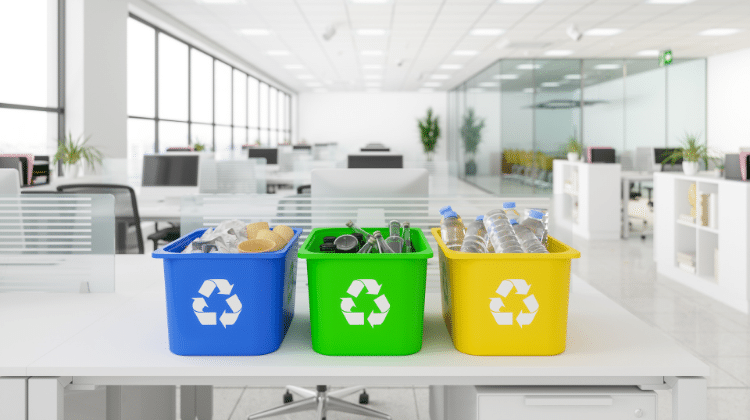
Brought to you by Mil-tek:
Does your business need to improve its recycling program? Don’t worry. You’re not alone! Worldwide, businesses struggle to develop their recycling programs, and adoption can be a difficult battle. The great news is that your employees can take steps to encourage eco-friendly initiatives.
Here’s how to encourage your team to recycle more with these five super-easy ways to implement and improve your recycling program. These ideas could change your company culture!
1. Do a Quick Company Survey
Are the recycling bins in your company visible? It’s time to do a survey and find out. This may surprise you, but your recycling cans might be located in the wrong spot. They could be hard to access for some of your employees. If there aren’t any helpful directions about what to recycle and where, they’ll be confused and may do nothing.
Fortunately, there are some ways to optimize where your recycling bins are located. Do a survey and your employees what would make it easier for them to recycle while at work? According to a survey in the UK, 66% responded that consistent packaging would encourage them to recycle more, but knowing what to recycle is just the first step. They also need to know where to recycle packages. Here are some tips to help them:
- Ensure you place enough bins for the size of your business.
- Place the bins somewhere visible and easy to access.
- Put bins together with clear instructions about how to separate materials.
- Put recycling cans near usage hotspots.
Examining your bin location is a great idea to improve recycling results permanently. Ask your employees about this idea, and review your recycling program to see where you can make improvements.
2. Balers for Plastic and Other Packaging Waste
Whether your business handles plastic, foil, metals, or other types of waste, one thing is for sure: it can all be recycled. In fact, some countries are setting recycling goals. For example, the recycling rate in Denmark increased in 2016 to 46.9%. The Danish Government has new goals for 2022: recycling 50% of all paper and beverage packaging. Local authorities are currently responsible for collecting household and business waste. You can set goals for your company as well.
The solution could be Miltek baler, a company that provides waste and recycling solutions, Ballepressere compactors for cardboard (baler is Ballepressere in Denmark), polystyrene, etc. You can even do a review of your business to see how much you can optimize your waste.
Balers, production plants, and retail – they all generate waste, which can cause significant costs for the company. You can make a difference at your company by implementing machines to compact your plastic waste. Plastic balers reduce waste volume by 90%+. Equipping your company with a plastic baler will reduce waste management costs and the time your team spends on disposal.
3. Encourage Environmental Consciousness in the Workplace
More and more businesses worldwide are committing to reduce their impact on the environment. Having eco-friendly programs and policies in place will encourage green behaviors among employees.
For example, companies like Starbucks have started to eliminate plastic straws in an effort to reduce plastic waste. This is a smart and very helpful move, and you can learn from this and other newsworthy examples of organizations that take the initiative to create a more environmentally conscious workplace through eco-friendly policies.
Furthermore, consumers are more inclined to buy from companies that invest in recycling and prove their commitments to social responsibility. In fact, 88% of consumers are likely to spend more at a company that invests in sustainability.
4. Recycling for Profit
Global waste is predicted to grow by 70% by 2050 unless urgent actions are taken. As nature’s residents, we constantly need to consume varying amounts of our planet’s resources, like water, materials to develop products, and oil and gases to power our homes and vehicles. Over time, we started to consume more natural resources than necessary, and as a consequence, the amount of waste generated today is out of control.
Reports suggest that global annual waste generation is predicted to jump as high as 3.4 billion tons in future decades. That’s a significant increase compared to 2.01 billion tons recorded in 2016. We’re talking about an increase of 70%.
Businesses should invest more in recycled products. In fact, recycling is not important only for recovering recyclable material, but it’s an entire economic system that delivers true value in the long term. If your company isn’t recycling yet, you could miss out on a lot of benefits, including increased profits. One of the important reasons why recycling is important for businesses is the simple fact that it ultimately saves money.
A recycling program in a business is cost-effective and frees you up from costs that you can invest in other eco-friendly initiatives. A well-maintained recycling program can generate up to $100,000+/employee/year. Saving bit dollars for your business while saving the planet? It’s a win-win situation.
5. Attracting Higher Quality Employees While Improving Retention
Not only are consumers are demanding eco-friendlier products, but employees are as well. It’s simple — employees are likely to work for a company that recycles. In fact, workplace sustainability and recycling are more critical to Millennials than older generations. About one in 10 Millennials would agree to switch their job or quit if their employer refuses to be sustainable. This is a highly relevant fact considering that plenty of Millennials want to change their jobs within the next five years.
If you want to do the right thing for your company, start implementing a recycling program in your organization. It’s the perfect way to make both employees and customers feel like they’re making a positive impact on the planet.